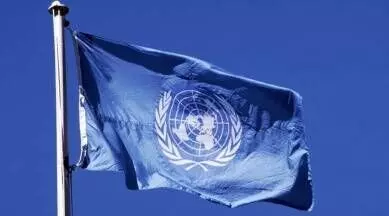
Food insecurity on the rise: Invest in Sustainable food cold chains, says UN
text_fieldsEgypt: As food insecurity and Global warming rise, UN urges Governments, International development partners and industry to invest in sustainable food cold chains in order to decrease the hunger crisis, provide livelihoods to communities, and adapt to climate change.
The Sustainable Food Cold Chains report from the UN Environment Programme (UNEP) and the Food and Agriculture Organisation (FAO), presented at the At 27th Climate Change Conference, finds that food cold chains are critical to meeting the challenge of feeding an additional two billion people by 2050 and harnessing rural communities' resilience, while avoiding increased greenhouse gas emissions.
The report was developed in the framework of the UNEP-led Cool Coalition in partnership with FAO, the Ozone Secretariat, UNEP Ozone Action Programme, and the Climate and Clean Air Coalition.
"At a time when the International community must act to address the climate and food crises, sustainable food cold chains can make a massive difference," said Inger Andersen, Executive Director of UNEP.
"They allow us to reduce food loss, improve food security, slow greenhouse gas emissions, create jobs, reduce poverty and build resilience - all in one fell swoop." He Added.
The number of people affected by hunger in the world rose to 828 million in 2021, a year-on-year rise of 46 million. Almost 3.1 billion people could not afford a healthy diet in 2020, up 112 million from 2019, as the economic impacts of the Covid pandemic drove up inflation. This year, meanwhile, the conflict in Ukraine has raised the prices of basic grains threatening food security.
All of this comes while an estimated 14 per cent of all food produced for human consumption is lost before it reaches the consumer. The lack of an effective cold chain to maintain the quality, nutritional value and safety of food is one of the major contributors to food loss.
According to the report, developing countries could save 144 million tonnes of food annually if they reached the same level of food cold chain infrastructure as developed countries.
As post-harvest food loss reduces the income of 470 million small-scale farmers by 15 per cent, mainly in developing countries. Investing in sustainable food cold chains would help lift these farm families out of poverty.
"Sustainable food cold chains can make an important difference in our collective efforts to achieve the Sustainable Development Goals. All stakeholders can help implement the findings of this report, to transform agrifood systems to be more efficient, more inclusive, more resilient and more sustainable - for better production, better nutrition, a better environment and a better life for all, leaving no one behind," said QU Dongyu, Director-General of FAO.























